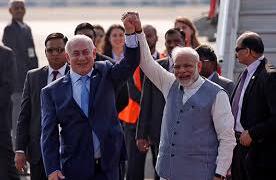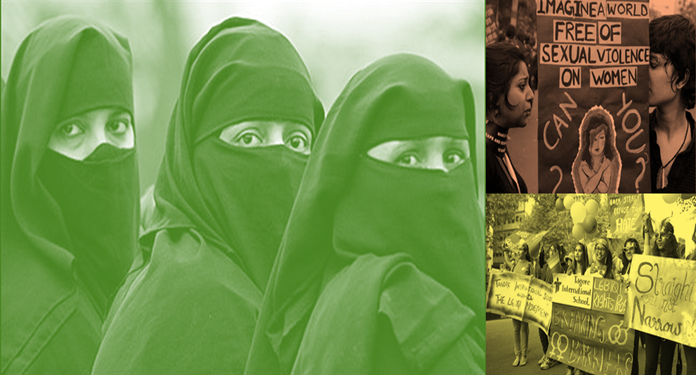In the colonial as well as the post-colonial period, India has gone through a wave of rapid Feminism; this was taken into consideration by the Legislators too. It is manifest in the fact that in 1829 itself, the British Government took notice of Sati Pratha and abolished it by way of a Regulation. In the post-colonial period too, a number of laws were passed, the Hindu Law was codified and amendments were made, to rid women of a lower status in the society, but this was by far limited to the Hindu Society. Thus, while Hindu Society has recognized Monogamy and Maintenance of women after divorce, the Muslim Society has not recognized strict Monogamy; neither has the active Feminist section made active demands for elevating the status of Muslim Women. Following is the comparison between the status of Hindu Women and Muslim Women in certain key areas:
Polygyny in Muslim Society:
Hindu Law was suitably modified through the Hindu Marriage Act, 1955, and bigamy was thus made an offence, until then both Hindu and Muslim societies were polygamous. Though the modification in the Hindu Society is welcome, the fact remains that still polygamous nature of Muslim Society, where the husband can still marry four times shows unwillingness among the legislators to get rid of chauvinism and male ego in the Muslim Society. Moreover, it is fallacious to say that it is necessary to allow polygamy in the Muslim Society for religious freedom, as it is not obligatory in Islam to marry four times. In fact, the Quran, the holy book of Islam from which Islamic law is derived, strongly discourages Polygyny though it does not prohibit Polygamy altogether. Therefore, a law prohibiting polygamy will actually be more in consonance with the Islam rather than being anti Islamic.
Biased form of Talaq:
Talaq is recognized as the sole right of the husband in the Islamic law, whereas under the Hindu Law the husband does not have such autocratic divorce rights. The husband thus according to his whims and fancies can use Triple Talaq and divorce his wife without her consent. The right of the husband to divorce his wife in an autocratic and unreasonable manner without any obligation to maintain her post the period of Iddat, i.e. a fixed period of time after divorce during which the wife cannot marry another husband ensured a deplorable status for the Muslim women.
Under the Hindu Law, both the husband and wife have somewhat concurrent powers of divorce and none can divorce the other without any reasonable cause, moreover the codified Hindu law makes it somewhat simpler and the scope of Judicial Activism is minimized. This is not the case with Muslim law of divorce; it is still based on customs and Old Islamic Law which due to its obsolete and uncodified nature makes it even more complex.
Primitive Law of inheritance:
The traditional Hindu Law, Mitakshara, did not provide any inheritance rights to the woman. The Islamic law did have inheritance rights, though the inheritance rights of the male were two times the right of the female (in case the concerned male and female are siblings). In other cases the share of the woman in inheritance is even lower.
The position has changed upside down after 2005, when the Hindu Succession Act, 1956 was amended and now the Hindu female has equal inheritance rights as her male counterpart. The legislators have again somehow forgotten to correct the flaw with the old Islamic law and the age old laws of succession still govern inheritance among Muslims.
Who is to be blamed?
The legislators are the biggest culprits for the deplorable status of the Muslim women. The legislators have not only failed to bring the Muslim society at par with the rest of the society but they have even made an attempt to pull the Islamic women down to a deplorable situation. The most manifest of such politicization is the Shah Bano’s Case, where the Supreme Court gave the much deserved right of maintenance to the Muslim women even after the Iddat Period. The Rajiv Gandhi Government though, committed a cardinal sin when it passed the Protection of Rights of Muslim Women on Divorce Act, to override the effect of the Shah Bano pronouncement.
The only runner ups to the lawmakers as far as the condition of Muslim Women is considered are the infamous feminists of India. They have shown the willingness to what is now a well evolved Hindu Society but have veiled the legally insignificant position of Indian women on the name of religious freedom. Somehow, they fail to find the Muslim Hijab as harmful as the Hindu veil. This convenient ignorance and silence towards the pity condition of Muslim women, has done only more harm than good to Islam.
Conclusion:
The development level of any society can be seen through the status of its women, so is the case with a religious community. The cardinal reason behind underdevelopment of Muslim population is not any discriminatory politics biased against Islam but a societal and systematic oppression of its women by the community and the legislators. The legislators (Pseudo Seculars) have in fact kept the Muslim law on a different pedestal to avoid a Uniform Civil Code which has the potential of giving an end to vote bank evil and an essential of a pluralistic society.
The only institution which has played a positive role in reforming the Muslim Law is the Judiciary, whether it was the Daniel Lattifi case where the Supreme Court interpreted the obsolete law passed by the Rajiv Gandhi Government to vest the right of maintenance in the Muslim Woman or the Shamim Ara case where the Supreme Court diluted the right of the Muslim husband to divorce his wife. The Supreme Court has without any iota of doubt always stood up for this sensitive and grave issue.
The Muslim Society even after having ruled India for several centuries and being in a better situation compared to Hindus today lives in abject poverty and Stone Age personal laws. It is because of a high child birth ratio among Muslims, the feminists again deny that women among Muslims are being treated as baby machines on the name of collective consciousness.
A uniform policy as far as personal laws as family planning is concerned will do well to the long oppressed Muslim women but will also take the Muslim Community on a better pedestal, it’s unfortunate that this has not happened since Independence as Vajpayee once said ‘Other Parties are not asking the Muslims to change their societies accordingly for a Uniform Civil Code but are actually spreading lies among that community’. We cannot wait for the society to reform itself which does not seem like happening and then change the law, instead the law has to be used as a tool for social change as was done in the case of the Hindu Society.




























